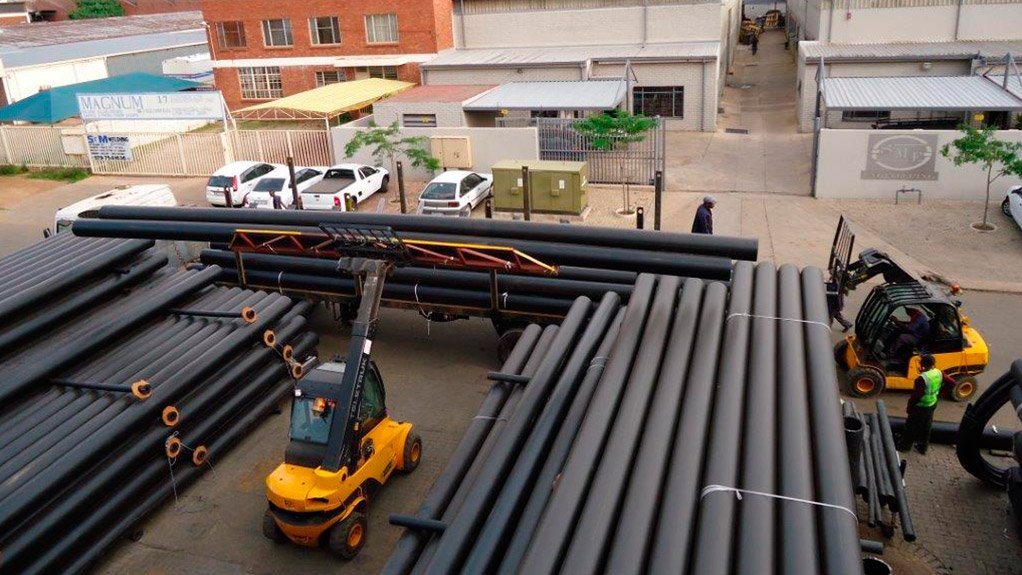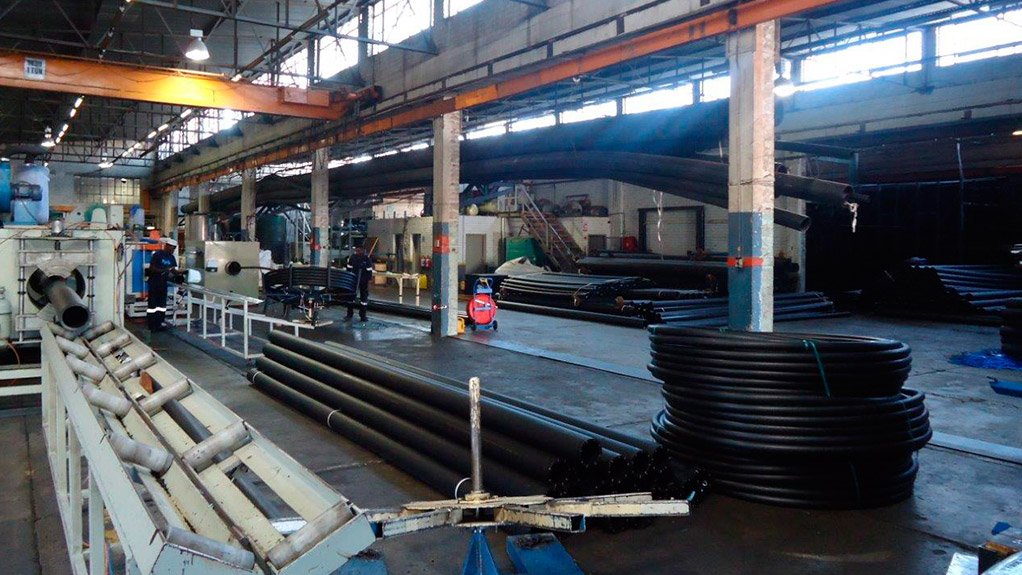Pipe oversupply creates fierce competitiveness



OVERSUPPLY ISSUE If demand continues to be unfavourable, the sustainability of manufacturers will be under pressure
EFFICIENCY INCREASE Pipeflo is enhancing its production efficiencies and has put plans in place to compensate for lost time during load-shedding
A current oversupply of high-density polyethylene (HDPE) pipes in the domestic and export markets is leading to fierce competition between local suppliers and manufacturers, says Pretoria-based plastic pipes manufacturer PipeFlo.
PipeFlo CEO Lizl du Preez tells Engineering News that this oversupply has resulted in significantly lower prices for customers and in manufacturers’ increased focus on running operations efficiently.
“The risk is, if demand continues to be unfavourable, the sustainability of manufacturers will be under pressure,” she says.
To solve the oversupply issue, Du Preez believes that South Africa’s investment needs to change. “The implementation of the National Development Plan (NDP) should contribute towards improving market demand in South Africa.”
She says a significant number of pipes are used in the mining industry worldwide, but local demand for HDPE pipes has been negatively affected by the poor investment climate. She adds that global commodity prices are under pressure and major projects in the Democratic Republic of Congo are either completed or nearing completion, and have also caused HDPE pipe demand to decrease.
Du Preez says the local construction industry is also under pressure with “very low demand” for pipes and that “government needs to start implementing the NDP, which will boost demand for local pipes”.
Load-Shedding Production Impact
Du Preez notes that load-shedding is also impacting significantly on pipe extrusion businesses’ production, as each incidence of load-shedding leads to more product having to be scrapped and significant losses in production.
After load-shedding, it takes a minimum of two hours for machinery to reach the correct operating temperatures to start up again, leading to more time delays, she says, noting that “other machines take as long as four hours to reboot”.
Du Preez tells Engineering News that, while PipeFlo does its best to work around the load-shedding schedules, unplanned outages could result in an entire production line being scrapped.
“As the pipes market is already under pressure, any increase in scrap adds further strain to profit margins,” she explains, further noting that the looming hike in electricity tariffs will also add to already strained profit margins.
Moreover, the fluctuating exchange rates and oil price make the buying of raw materials difficult.
To overcome these challenges, PipeFlo is enhancing its production efficiencies and has put plans in place to compensate for lost time during load-shedding. “We have a reputation in the industry for manufacturing quality products and for delivering good customer service on time,” she says.
Skills Development
PipeFlo values its employees and understands that they are key to the company’s sustainability, says Du Preez, adding that PipeFlo has various programmes to ensure employees are appropriately trained and skilled.
One of the programmes involves sending PipeFlo personnel to the Plastics South Africa training programme, whereby they are trained in supervisory management and the principles of quality. “Our employees who undergo this training return to mentor and provide presentations for their colleagues . . . It is extremely effective,” she says.
The company also facilitates on-the-job training and regular training sessions to ensure that personnel are adequately trained. This includes PipeFlo awareness training to ensure that the company’s manufacturing procedure complies with the South African Bureau of Standards (SABS). This SABS training is conducted at least biannually.
“Safety training is an ongoing exercise,” adds Du Preez.
Improving Communication and Quality
PipeFlo uses new technology to improve communication in the company.
“We have improved our communication technology to such a point that PipeFlo now has continuous communication on the factory floor among all employees. Everyone now works with the same information and towards the same goals,” says Du Preez, adding that this has led to real-time cost savings, besides other aspects.
In terms of quality, PipeFlo employs trained quality controllers who are on duty with every shift. “Every pipe is checked at least twice, once by the operator and again by a quality controller,” she says.
In-house laboratory tests are also performed at PipeFlo’s facility on all-raw materials before they are used in the manufacturing process. The finished product is also tested to ensure that no deviation has occurred during the manufacturing process.
To create independence from the production department, the quality controllers report directly to the CEO.
Article Enquiry
Email Article
Save Article
Feedback
To advertise email advertising@creamermedia.co.za or click here
Announcements
What's On
Subscribe to improve your user experience...
Option 1 (equivalent of R125 a month):
Receive a weekly copy of Creamer Media's Engineering News & Mining Weekly magazine
(print copy for those in South Africa and e-magazine for those outside of South Africa)
Receive daily email newsletters
Access to full search results
Access archive of magazine back copies
Access to Projects in Progress
Access to ONE Research Report of your choice in PDF format
Option 2 (equivalent of R375 a month):
All benefits from Option 1
PLUS
Access to Creamer Media's Research Channel Africa for ALL Research Reports, in PDF format, on various industrial and mining sectors
including Electricity; Water; Energy Transition; Hydrogen; Roads, Rail and Ports; Coal; Gold; Platinum; Battery Metals; etc.
Already a subscriber?
Forgotten your password?
Receive weekly copy of Creamer Media's Engineering News & Mining Weekly magazine (print copy for those in South Africa and e-magazine for those outside of South Africa)
➕
Recieve daily email newsletters
➕
Access to full search results
➕
Access archive of magazine back copies
➕
Access to Projects in Progress
➕
Access to ONE Research Report of your choice in PDF format
RESEARCH CHANNEL AFRICA
R4500 (equivalent of R375 a month)
SUBSCRIBEAll benefits from Option 1
➕
Access to Creamer Media's Research Channel Africa for ALL Research Reports on various industrial and mining sectors, in PDF format, including on:
Electricity
➕
Water
➕
Energy Transition
➕
Hydrogen
➕
Roads, Rail and Ports
➕
Coal
➕
Gold
➕
Platinum
➕
Battery Metals
➕
etc.
Receive all benefits from Option 1 or Option 2 delivered to numerous people at your company
➕
Multiple User names and Passwords for simultaneous log-ins
➕
Intranet integration access to all in your organisation



















